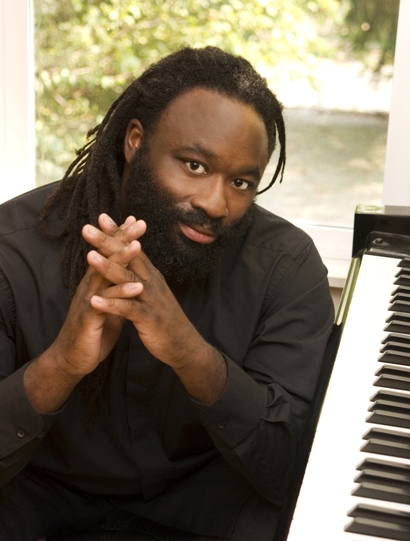Pianist Pratt brings old-fashioned virtuosity to Coral Gables
Awadagin Pratt’s recital for the Coral Gables Congregational Church concert series Thursday night was a super-charged demonstration of old school, larger-than-life keyboard virtuosity and showmanship. Pratt’s technique is awesome, capable of the most fiendish pyrotechnics and subtle colors and shadings. Wedded to his impressive digital dexterity, Pratt is a fascinating musical personality who brings an inquisitive interpretive viewpoint to the most thrice-familiar fare.
Opening with Beethoven’s Sonata in E, Op.14, No.1, Pratt maintained fleet, brisk tempos in the opening Allegro. His light, airy touch and forward momentum went a long way toward removing accumulated mannerisms that affect more mundane performances. In the noble Allegretto, Pratt’s command of grand musical gestures and attention to the modulations into a minor key spotlighted the drama beneath the music’s classical surface. The final Rondo was stormy and flamboyant, an antidote to the finely chiseled Beethoven performances of many a recitalist.
Robert Schumann’s Etudes in the Form of Free Variations on a Theme of Beethoven proved an arresting novelty and innovative tribute to the two-hundredth anniversary of the composer’s birth. Pratt explained to the large audience that this score was never completed and only published in 1976. Schumann had worked on this set of variations on the main theme of the Allegretto from Beethoven’s Seventh Symphony sporadically up till his final tragic days. Since the composer never organized the sequence of the score, Pratt chose to play all the variations first, followed by the familiar theme.
This work finds Schumann at his most severe while challenging the pianist with numerous tests of speed and power. Pratt brought appropriate gravitas to Schumann’s often dark vision while darting across the keyboard at lightning pace in the more extroverted episodes.
Pratt’s own transcription of J.S. Bach’s Passacaglia and Fugue in C minor achieved a surprising organ-like sonority and dimension. This keyboard tour de force was Bach in the manner of Franz List, uninhibited in bravura display. For all the sheer power of Pratt’s pianism, he brought clarity to the fugal patterns and springy, dance-inflected rhythms to Bach’s contrapuntal writing.
In an interlude of calm before a Lisztian storm, Pratt emphasized the dark undertones below the salon lyricism of Chopin’s Nocturne in B major, Op.62, No.1. His sense of singing line brought an almost vocal quality to Chopin’s melodic invention. Pratt is not afraid to liberally apply rubato to the melodic thread in true romantic fashion, harkening back to an earlier generation of pianists.
Pratt’s version of Liszt’s Sonata in B minor was not for the faint of heart. His hands flew across the keyboard with demonic fury and he was able to maintain that frightening intensity from the ominous opening to the final chords, the coda bringing less consolation than despair. Pratt’s superb articulation and devilish energy did not preclude the most extreme range of dynamics, from powerful volleys to the softest tonal whispers.
Pratt offered Liszt’s transcription of a romantic Schumann lied as an encore, the keyboard sounding like lustrous orchestral strings in full bloom.
Posted in Uncategorized
Leave a Comment
Fri Jul 16, 2010
at 9:45 am
No Comments
